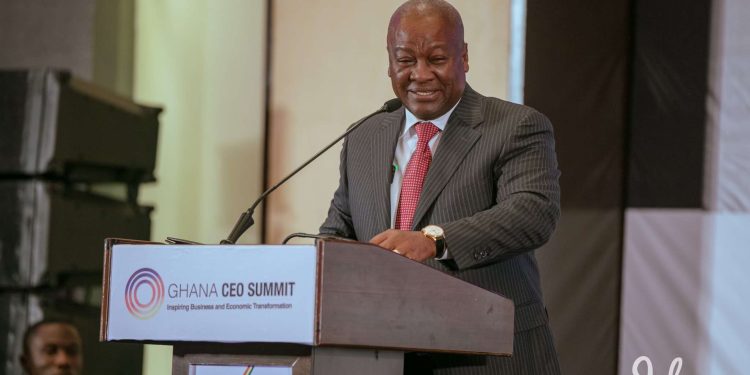President Mahama Proposes Empowering MMDAs with Municipal Bonds to Fund Infrastructure under New Economic Strategy
President John Dramani Mahama has outlined an eight-pillar strategy to stabilise Ghana’s ailing economy, with a key focus on empowering Metropolitan, Municipal and District Assemblies (MMDAs) to independently finance local infrastructure through municipal bonds.
Speaking at the 9th Ghana CEO Summit held in Accra on Monday, under the theme “Leading Ghana’s Economic Reset: Transforming Business and Governance for a Sustainable Futuristic Economy,” the President stated that his administration intends to enable MMDAs secure municipal bonds against portions of their District Assemblies Common Fund.
The funds, he noted, would be earmarked for the construction of roads, schools, water systems and the development of local industries in districts across the country.
“My Government intends to empower MMDAs to ensure infrastructure and municipal bonds secured against a portion of the district assembly common fund to fund infrastructure projects such as roads, schools, water systems and local industry in the districts,” President Mahama stated.
The proposed municipal financing model forms part of a broader economic reset strategy that emphasizes fiscal discipline and value-for-money investments.
According to President Mahama, future public borrowing—whether by Ministries, Departments and Agencies (MDAs), MMDAs or State-Owned Enterprises (SOEs)—would be strictly tied to self-financing and commercially viable projects.
This, he said, would ensure sustainable debt servicing and improved investor confidence.
Referencing his previous tenure, the President recounted how Ghana issued four Eurobonds between 2013 and 2016, all without default, supported by a sinking fund mechanism financed largely from oil revenues.
“We applied over $335 million from our oil-funded sinking fund to settle maturing euro bond liabilities. We refinanced the $200 million HIPC-era 2007 euro bond, through our 2015 World Bank-guaranteed bond. And before we left office, we left sufficient reserves, enabling the next administration to pay off the balance in 2017 without distress,” he said.
President Mahama emphasised that the sound fiscal structure established under his previous administration was not “magic” but a product of discipline and foresight.
However, he lamented that the framework was dismantled after 2017, leading to reckless borrowing and subsequent default on both domestic and external bonds—a first in Ghana’s post-independence history.
“Between 2017 and 2022, debt accumulation skyrocketed, and yet the framework to ensure repayment was abandoned. As a consequence, Ghana defaulted on both the domestic and external bond debts. Investors, businesses, and pensioners suffered crushing losses through the domestic debt exchange programme, with crude haircuts eroding trust in the financial system,” he bemoaned.
He added that Ghana’s credit rating has since been downgraded to junk status, public sector arrears have ballooned, and SMEs have been crowded out of the credit market.
The President’s remarks come as Ghana continues to implement reforms under an International Monetary Fund (IMF) bailout programme aimed at restoring macroeconomic stability and debt sustainability.







